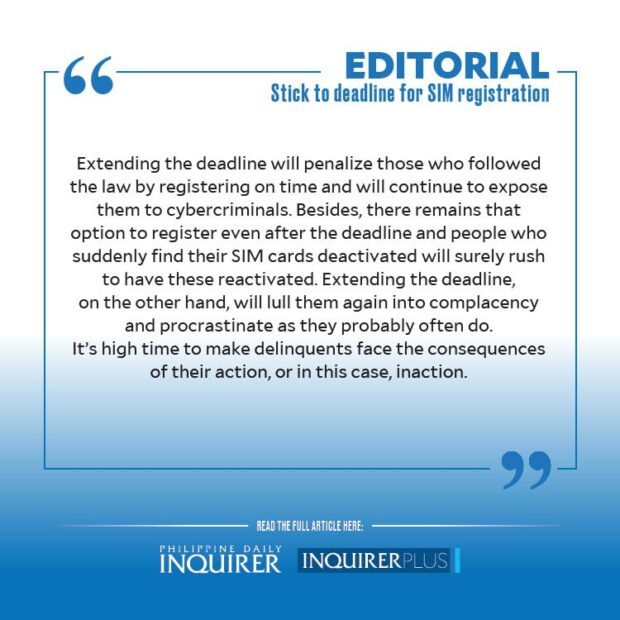The last day for the registration of subscriber identity module (SIM) cards set on Wednesday should not be extended. President Marcos signed Republic Act No. 11934, or the SIM Registration Act, on Oct. 10, 2022, to “promote the responsible use of SIMs and provide law enforcement agencies the necessary tools to crack down on perpetrators who use SIMs for their crimes.”
Under the law, existing phone users must register their SIM cards, while new buyers must present documents for identification. This ensures that someone will be held accountable for text messages or calls previously sent incognito or anonymously. The measure is part of the government’s effort to curb fraudulent activities such as text-related scams and identity theft perpetrated through text messages.
Mobile phone users were given more than six months to register their SIM cards, a process that takes no more than 10 minutes. As the deadline drew closer, however, the Department of Information and Communications Technology (DICT) received a number of petitions to extend the deadline.
Dito Telecommunity, the third telco player, submitted a position paper last week to the DICT requesting a 120-day extension as only 40.2 percent of its users have registered. PLDT Inc.’s mobile unit Smart, which says only 55.1 percent of its total users have registered their SIM cards, also filed a petition before the DICT and the National Telecommunications Commission (NTC) on April 12 purportedly to give “ample time’’ to all mobile users, particularly those located in remote areas of the country, to register their SIMs.”
Globe, which says it has registered 38 percent of its subscribers, also reasoned that an extension is needed to give their subscribers more time to get the necessary government IDs required in the registration process. Journalists and activists have even petitioned the Supreme Court to issue a temporary restraining order on the SIM Registration Act, citing threats to data privacy and freedom of speech.
It is comforting that the DICT is standing firm. In response to the extension requests, the DICT said in a statement last week that “at this point, there is no extension of SIM registration.” With two days to go before the deadline and for the DICT to change its mind, it is well advised to be firm in rejecting all pleas for an extension, and direct telcos to deactivate all unregistered numbers after this date. It should simply remind the public that nonregistration will result in the deactivation of SIMs, barring them from receiving and sending calls and text messages as well as accessing mobile applications and digital wallets.
There are a number of reasons why the deadline should not be extended. Mobile users were given more than enough time to do an activity that takes a few minutes, and for telco players to have spent more effort in helping the government by physically going to nonurban areas where their subscribers are and having them register their SIM cards.
Their reason for the lack of IDs is also weak as the guidelines of the law provide various options on proof of identification, listing the following acceptable valid IDs: PhilSys National ID, driver’s license, Unified Multipurpose ID, or UMID card, Social Security System or Government Service Insurance System member’s card, senior citizen’s card, passport, police or NBI clearance, voter’s ID, tax identification number card, person with disability card, government office ID, or school ID in case of minors.
While possession of a valid ID is a problem for some people in far-flung or very remote areas, this should not be reason enough to extend altogether the deadline for everyone else. The government can still adopt suggestions for the ID problem, but this should be done after the deadline. Worth noting at this point is that the SIM registration process could have moved faster had the national ID system been put in place much earlier.
The most important reason not to extend the registration deadline, however, is the main objective of the SIM registration exercise, which is to weed out scammers victimizing tens of thousands of ordinary Filipinos. It’s reasonable to think some of those yet-to-be-registered SIM cards were part of these scammers, and that is why Jon Paulo Salvahan, National Telecommunications Commission deputy commissioner, said the agency was not expecting 100 percent registration.
Extending the deadline will penalize those who followed the law by registering on time and will continue to expose them to cybercriminals. Besides, there remains that option to register even after the deadline and people who suddenly find their SIM cards deactivated will surely rush to have these reactivated. Extending the deadline, on the other hand, will lull them again into complacency and procrastinate as they probably often do. It’s high time to make delinquents face the consequences of their action, or in this case, inaction.


